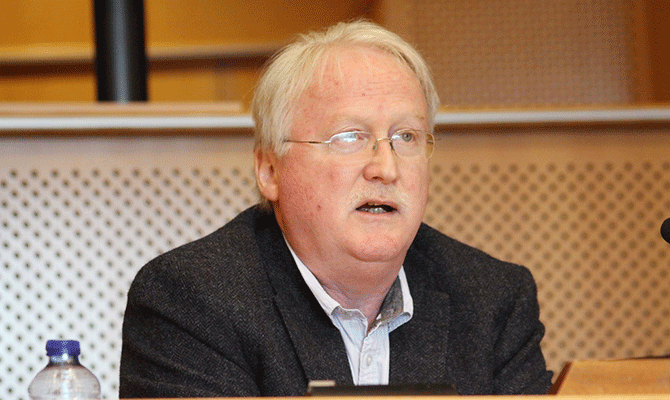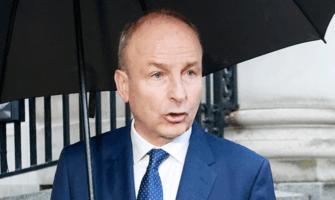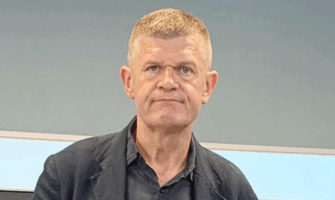
John Hegarty
TO ALL other media, the Irish Times exudes high principles, standards and a commitment to objective journalism. The paper claims to be liberal, a wholly independent voice with no hidden financial or political bias. It is especially censorious of sectarianism and narrow religious dogma. Overseeing such standards is the Irish Times Trust, chaired by Professor John Hegarty, former provost of Trinity College Dublin. But in recent years the trust has refused to do anything about its newspaper’s sectarian, one-sided policy of covering child abuse in Catholic institutions and its refusal to cover child abuse in Protestant institutions.
The IT reported in 2004 that “Hegarty has an unusual background for a Trinity provost. He is a former Maynooth seminarian, in a college which elected its first Catholic provost only 13 years ago”. Although the IT appointed its first Catholic editor only five years earlier, the point was ignored when Prof Hegarty was appointed to chair the trust – another first – in 2017.
John Hegarty abandoned the priesthood for professor of laser physics, followed by head of physics and dean of research in Trinity. His administration role, noted the IT, concentrated on bureaucracy and cost-cutting at the expense of leadership and vision.
In the ‘About Us’ section, located in small print at the bottom of irishtimes.com, is a link to the Irish Times Trust, which includes the ‘principles’ of the IT and a description of the paper’s unique structure; a list of trust members and of a board it appoints (three trust members, including Hegarty, sit on it); plus a history of the paper.
Among other things the trust is tasked with guaranteeing “the independence and quality of the newspaper”. It upholds support for democracy, social justice, a “friendly society” infused “with Christian values, but free from all religious bias and discrimination”. It also says: “Special consideration… [is] given to the reasonable representation of minority interests and divergent views”.
Irish Times transparency, however, is bathed in an opaque mist.
There is no indication how trust members are appointed and there is no news of what the trust does. And chairman John Hegarty appears to be happy that besides no annual report, there is no public record of discussion or decisions taken, agenda items or even an indication of how often it meets. And no email address adorns the trust website page.
As Niall Meehan of Griffith College’s journalism and media department recently discovered, you write to the managing director’s PA, who passes messages to John Hegarty. He then decides if the supplicant’s message is deemed fit for consideration.
The history section asserts, falsely, that when founded in 1859 it was conservative but after 1922 became “independent”. Earlier, in 1921, the paper asserted that the Black and Tans stood between Irish society and anarchy. In 1933 a Nazi electoral victory was welcomed, not without fastidious equivocation: fascists stood between German society and Bolshevik anarchy. In 1950, alongside the conservative private-practice-focussed medical profession, the paper criticised a free mother and child scheme under health minister Noel Browne: it smacked of irresponsible socialism.
Originally the brainchild of Protestant-unionist businessmen, the IT carried a British royal coat of arms until the late 1930s. Alongside vast swathes of Irish businesses, the paper discriminated against Catholics until the 1970s. It carried Protestant-only employment advertisements regularly.
It was also, happily, out of sync with increasingly criticised Roman Catholic Church dominance in southern Irish society. Decline in the Catholic Church’s power and exposure of many faults was due mainly to women in revolt against church controls, the left in the broadest sense, anti-clerical republicans and media exposure. The IT, under the 1960s-70s Protestant-republican editorship of Douglas Gageby, was one of the first to reflect this. Circulation soared.
The newspaper has long promoted a liberal face that obscures its conservatism. A classic example is that, after criticising Browne’s ministerial measure in 1950 – the iconic mother and child scheme – the paper then supported him against Roman Catholic Church opposition that contributed to Browne’s ministerial downfall.
As the Church of Ireland Gazette put it, when referring to Protestant doctors’ attitudes, they weren’t sorry to see Browne go but were sorry to see the manner of his going.
Forgetting about its former position, after publishing Browne’s correspondence with bishops, the paper came out of it smelling of roses. It has given off the same scent since.

Niall Meehan
BETHANY HOME
Until it was pointed out by The Phoenix in 2021, IT journalists did not know that the newspaper’s 1954-74 owners, the Walker Brothers, and solicitors Hayes & Sons – still the paper’s legal firm – were involved with the Protestant evangelical Bethany Home, an unmarried mother and baby institution. At least 260 children died there, buried in unmarked graves.
In 2014 Hayes denied all knowledge of irregular ‘adoption agreements’ concluded to the disadvantage of unmarried mothers in Bethany as a punishment. The late Adrian Glover, an IT-associated Hayes senior partner and son of Bethany matron Katherine Glover, also disclaimed any knowledge of these or related records, although he wrote some of them.
Victims of pharmaceutical trials in a Church of Ireland children’s home, Smyly’s Homes, thought Glover disingenuous. He ‘advised’ them without revealing he represented the Medical Protection Society.
Though in possession of alleged victims’ allegations of gross abuse in Smyly’s, the IT refused to publicise them and has never looked critically at the institution. Instead, many journalists think that criticising only the Catholic Church is a sign of fearless objectivity. They think the Catholic Church unique in its negative treatment of women and children.
A feature of the Irish state since its inception was to use the Roman Catholic Church to socialise the mainly poor majority away from radicalism and into dulled conformity. Disenchantment spread and led to open revolt when clerical sex scandals broke during the 1990s-2000s. The media focused especially on the Catholic Church’s control of detention centres, franchised by the state the same way that education still is.
Government strategy was to encourage attention on the Catholic Church, so as to take it off itself. That required ensuring little or no examination of state regulation, which would include Protestant institutions such as Smyly’s. Squaring up to the Catholic Church looked non-sectarian, which was a bonus. How things seem, as distinct from how they are, is important in politics.
To succeed, the media would have to play ball, which overwhelmingly it did, not least because Catholic victims in their droves provided copious amounts of copy.
But what about Protestant victims? They were to some incomprehensible, to others a complication in a story of a people in revolt against Catholic control. None was more eager in this role than the IT. Protestant victims were studiously ignored.
A recent example is of interest. In March 2023 the Government announced an investigation into historic abuse in educational institutions. Reports amplified abuse in Blackrock College and other Church-run fee-paying schools. This was after RTÉ Radio One broadcast a documentary with harrowing personal accounts from victims.
Education in fee-paying schools is essentially state education. The state sets the curriculum, inspects the schools and pays teachers’ salaries. Paying fees facilitates the better-off in instilling habits of individual self-interest and preferential social exclusion. The church-state alliance enabled that.
Public pressure mounted on education minister Norma Foley to do something. There were problems, though. Of the state’s 45 such schools, 14 (or over 30%) are Protestant, although Protestants constitute less than 5% of the state’s population. Inequality has social class and sectarian connotations still.
The Government resolved its dilemma by setting up an inquiry into schools run by religious orders – in other words, only those under Roman Catholic control (there are no Protestant religious orders). Thus, Protestant victims were excluded. It was a new sectarian departure for the Irish state that, historically, treated both main Christian traditions equally.
Meehan, who had researched Protestant institutions, immediately pointed this out to the IT, which throughout 2023 ignored his statement on the subject and his letters. He mentioned a comparable Protestant school, St Patrick’s Cathedral Grammar School, which, alongside St Patrick’s Cathedral under Dean Victor Griffin, covered up widespread sexual abuse in the 1980s by one of the state’s more prolific abusers, Patrick O’Brien. He was finally convicted on sample charges in 2016.
O’Brien’s victims have no recourse to the state’s inquiry. That is sectarian but not of a sort to interest the IT which, given its ‘principles’ and history, should be an ideal investigatory vehicle.
Meehan attempted to engage the trust on reporting failures as they concern the education inquiry and another story – broken by the BBC in late 2022 – of how the Church of Ireland in Belfast covered up for an abusing clergyman by sending him southwards to Tipperary in 1976.
Meehan wrote to the trust via the MD’s PA on August 1, 2023. After a reminder or two, a brief note from John Hegarty arrived three months later on November 6.
John Hegarty wrote: “Your correspondence with the Irish Times goes back quite a long time. I am fully confident that the allegations and perceptions you iterated many times before and again more recently have been comprehensively dealt with by the Editor and his team in their actions and communications with you.”
This puzzled Meehan, who had received no communications from the editor or his team and discerned no actions. He did not receive any (never mind “special”) consideration given “to the reasonable representation of minority interests and divergent views”.
Not since the press ombudsman persuaded the paper to publish a two-month-old letter from Meehan in January 2020 has he been allowed to vent his opinion on the treatment of Protestant victims. After that point, four years ago, the paper adopted a policy of omertà with regard to Meehan’s communications.
Meehan wrote again. John Hegarty replied (albeit after only 14 days this time): “… you have ignored my request to lay this matter to rest… the Editor and his team have acted in accordance with due process and care, I have nothing further to add.” He concluded: “I would ask you not to use my private email address.”
Meehan noted that “I responded to the address from which your email was sent” and asked John Hegarty not to be “silly”. He continued: “Resting on reasoned accusations of censorship is your position… Please do your job.”
The professor receives €31,000 annually for his efforts. He seemingly trusts more to inaction than in applying the lofty strictures of the Irish Times Trust.
Since then, the paper has not reported on the Church of Ireland last month settling a case taken by Eddie Gorman. He was a victim of Rev WG (Bill) Neely, the abusing clergyman the Church sent south to Tipperary in 1976. Some £100,000 and costs were paid.
Neither did the IT cover the Church’s barely noticed apology that stated it could not name Neely, citing Stormont legislation.
Tragically, as reported by Belfast’s Sunday Life, Gorman died last week.
The IT also ignored the Neely-founded Church of Ireland Historical Society (COIHS) falsification of its history. Late in 2022 the society removed all online references to Neely. Winners of its prestigious ‘WG Neely Prize’ had photos re-captioned to refer, falsely, to a ‘COIHS Prize’ – news in anyone’s language but not a lingo the IT currently speaks.
Still, there is good news in this bad news story. A recent Irish Times acquisition, the Irish Examiner, published Meehan letters that the IT refused to print. In the past the Examiner has published trenchant opinion pieces from Victoria White on Protestant victims of Protestant institutions.
It may be hoped that the Cork-based publication’s more objective news sense will infect its metropolitan cousins.



















